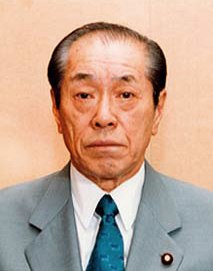Nonaka Hiromu
Nonaka Hiromu ( Japanese 野 中 広 務 , Nonaka Hiromu ; born October 20, 1925 in Sonobe , Funai County (today: Nantan ), Kyoto Prefecture ; † January 26, 2018 in Kyoto ) was a Japanese politician of the Liberal Democratic Party (LDP) .
biography
Nonaka Hiromu, who was exposed to discrimination because of his membership of the Burakumin , began his political career in 1950 with the election to the city council in his native Sonobe. At times he was vice-spokesman and also spokesman for the city council before he was elected mayor of Sonobe in 1958 . During this time he was, among other things, vice-chairman of the Association of Towns and Villages and the Government's Tax Commission for some time.
In 1967 he became a member of the Kyoto Prefecture Parliament. There he began his political argument with the long-time SPJ - CPJ -backed governor of the prefecture, Ninagawa Torazō , who ultimately contributed to his being voted out of office in 1978. Under Ninagawa's successor Hayashida Yukio , Nonaka became lieutenant governor of Kyoto in 1978 .
He was also the founder and operator of the first nursing home in Japan for people with severe intellectual disabilities in the 1970s .
In 1983 he was elected in a by-election in the constituency of Kyōto II (five seats, two for by-election) with the second highest percentage of votes behind Tanigaki Sadakazu as a representative of the LDP to the lower house ( Shūgiin ) and initially belonged to the Takeshita faction , the later faction to Obuchi Keizō .
During this time he became Parliamentary Deputy Minister for Construction in 1988 and then Chairman of the Communications Committee of the Lower House in 1991. Afterwards he was chairman of the building committee from 1993 to 1994 as well as chairman of the budget committee of the lower house.
On June 30, 1994, Prime Minister Murayama Tomiichi appointed him as Minister of the Interior ( Jichi-daijin ) in his cabinet . During this time, he was also chairman of the National Public Security Commission .
After leaving the cabinet, he became Deputy Secretary General ( kanjichō-dairi ) of the LDP and director of general affairs in the LDP's Strategic Campaign Center in 1995 .
After the inauguration of Obuchi as prime minister, he was by that on 30 July 1998 for the Cabinet Secretary in the Cabinet appointed and held this position until his replacement by Aoki Mikio at the end of Obuchi tenure on October 5, 1999. After a government reshuffle on 14th January 1999 he was at the same time until October 5, 1999 head of the authority for the development of Okinawa ( Okinawa Kaihatsu-chō ) .
He was later between April and December 2000 General Secretary of the LDP under Mori Yoshirō . He supported Mori in suppressing the so-called "Katō Rebellion" of Katō Kōichi against the party leadership.
When Yoshirō Mori resigned as Prime Minister on April 26, 2001, he was one of the candidates for possible successor, but he did not run and ultimately Jun'ichirō Koizumi was elected party chairman and thus became the new Prime Minister.
After retiring from day-to-day politics, he became a guest lecturer ( kyakuin kyōju , English lecturer ) at the "Heian Women's University" ( Heian Jogakuin Daigaku , Engl. Heian Jogakuin University ).
He is married and has a daughter.
Awards
Individual evidence
- ↑ Ex-top gov't spokesman, LDP heavyweight Nonaka dies at 92 ( Memento from January 26, 2018 in the Internet Archive )
- ↑ JANJAN, The Senkyo: By-election Kyōto 2 1983 ( Memento from April 17, 2009 in the Internet Archive )
- ↑ List of all decorations awarded by the Federal President for services to the Republic of Austria from 1952 (PDF; 6.9 MB)
Web links
- Profile of Chief Cabinet Secretary Hiromu Nonaka (October 1998)
- Head of the Pack. In: Time Magazine. April 2, 2001.
| personal data | |
|---|---|
| SURNAME | Nonaka, Hiromu |
| ALTERNATIVE NAMES | 野 中 広 務 (Japanese) |
| BRIEF DESCRIPTION | Japanese politician |
| DATE OF BIRTH | October 20, 1925 |
| PLACE OF BIRTH | Sonobe (Kyōto) , Funai (Funai-gun) County , Kyōto Prefecture , Japan |
| DATE OF DEATH | January 26, 2018 |
| Place of death | Kyoto |
